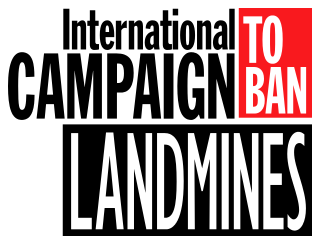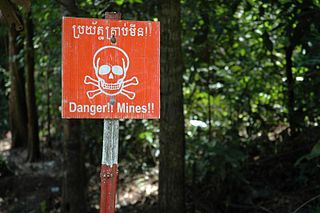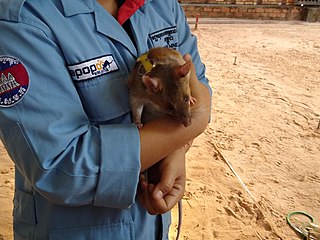Related Research Articles

A land mine is an explosive device concealed under or on the ground and designed to destroy or disable enemy targets, ranging from combatants to vehicles and tanks, as they pass over or near it. Such a device is typically detonated automatically by way of pressure when a target steps on it or drives over it, although other detonation mechanisms are also sometimes used. A land mine may cause damage by direct blast effect, by fragments that are thrown by the blast, or by both.

Mining is the extraction of valuable minerals or other geological materials from the Earth, usually from an ore body, lode, vein, seam, reef, or placer deposit. Exploitation of these deposits for raw material is based on the economic viability of investing in the equipment, labor, and energy required to extract, refine and transport the materials found at the mine to manufacturers who can use the material.

The International Campaign to Ban Landmines (ICBL) is a coalition of non-governmental organizations whose stated objective is a world free of anti-personnel mines and cluster munitions, where mine and cluster munitions survivors see their rights respected and can lead fulfilling lives.

Unexploded ordnance, unexploded bombs (UXBs), and explosive remnants of war (ERW) are explosive weapons that did not explode when they were employed and still pose a risk of detonation, sometimes many decades after they were used or discarded. UXO does not always originate from wars; areas such as military training grounds can also hold significant numbers, even after the area has been abandoned. UXO from World War I continue to be a hazard, with poisonous gas filled munitions still a problem. When unwanted munitions are found, they are sometimes destroyed in controlled explosions, but accidental detonation of even very old explosives also occurs, sometimes with fatal results.

The Square Kilometre Array (SKA) is an intergovernmental radio telescope project being planned to be built in Australia and South Africa. Conceived in the 1990s, and further developed and designed by the late-2010s, when completed sometime in the 2020s it will have a total collecting area of approximately one square kilometre. It will operate over a wide range of frequencies and its size will make it 50 times more sensitive than any other radio instrument. It will require very high performance central computing engines and long-haul links with a capacity greater than the global Internet traffic as of 2013. If built as planned, it should be able to survey the sky more than ten thousand times faster than before.

Demining or mine clearance is the process of removing land mines from an area. In military operations, the object is to rapidly clear a path through a minefield, and this is often done with devices such as mine plows and blast waves. By contrast, the goal of humanitarian demining is to remove all of the landmines to a given depth and make the land safe for human use. Specially trained dogs are also used to narrow down the search and verify that an area is cleared. Mechanical devices such as flails and excavators are sometimes used to clear mines.

The Black Sash is a South African human rights organisation. It was founded in Johannesburg in 1955 as a non-violent resistance organisation for liberal white women.

OpenStreetMap (OSM) is a collaborative project to create a free editable geographic database of the world. The geodata underlying the maps is considered the primary output of the project. The creation and growth of OSM has been motivated by restrictions on use or availability of map data across much of the world, and the advent of inexpensive portable satellite navigation devices.
Anglo American Platinum Limited is the world's largest primary producer of platinum, accounting for about 38% of the world's annual supply.

Cambodia is a country located in Southeast Asia that has a major problem with landmines, especially in rural areas. This is the legacy of three decades of war which has taken a severe toll on the Cambodians; it has some 40,000 amputees, which is one of the highest rates in the world. The Cambodian Mine Action Centre (CMAC) estimates that there may be as many as four to six million mines and other pieces of unexploded ordnance in Cambodia. Some estimates, however, run as high as ten million mines.
A mine clearance organization, or demining organization, is an organization involved in removal of landmines and unexploded ordnance (UXO) for military, humanitarian, or commercial reasons. Demining includes mine clearance, as well as surveying, mapping and marking of hazardous areas.
The Geneva International Centre for Humanitarian Demining is an international organisation working in mine action. Based in the Maison de la paix in Geneva, it is legally a non-profit foundation in Switzerland.

The Gambian pouched rat, also commonly known as the African giant pouched rat, is a species of nocturnal pouched rat of the giant pouched rat genus Cricetomys, in the family Nesomyidae. It is among the largest muroids in the world, growing up to about 0.9 m (3 ft) long, including the tail, which makes up half of its total length. It is widespread in sub-Saharan Africa, ranging from Senegal to Kenya and from Angola to Mozambique from sea level to 2,000 m (6,600 ft).
Mine action is a combination of humanitarian aid and development studies that aims to remove landmines and reduce the social, economic and environmental impact of them and the explosive remnants of war (ERW).

The Mines Advisory Group (MAG) is a non-governmental organization that assists people affected by landmines, unexploded ordnance, and small arms and light weapons.

On 5 December 2008, the Internet Watch Foundation (IWF), a British watchdog group, blacklisted content on the English Wikipedia related to Scorpions' 1976 studio album Virgin Killer, due to the presence of its controversial cover artwork, depicting a young girl posing nude, with a faux shattered-glass effect obscuring her genitalia. The image was deemed to be "potentially illegal content" under English law which forbids the possession or creation of indecent photographs of children. The IWF's blacklist are used in web filtering systems such as Cleanfeed.

APOPO is a registered Belgian non-governmental organisation and US non-profit which trains southern giant pouched rats to detect landmines and tuberculosis. They call their trained rats 'HeroRATs'.

The United Nations Mine Action Service (UNMAS) is a service located within the United Nations Department of Peacekeeping Operations that specializes in coordinating and implementing activities to limit the threat posed by mines, explosive remnants of war and improvised explosive devices.
AfriForum is a South African non-governmental organisation focused mainly on the interests of Afrikaners, a subgroup of the country's white population. Afriforum has been frequently described as a white nationalist, alt-right, and Afrikaner nationalist group, a description rejected by the organisation's leadership, who prefer to refer to themselves as a civil rights group.

Organizations from around the world responded to the West African Ebola virus epidemic. In July 2014, the World Health Organization (WHO) convened an emergency meeting with health ministers from eleven countries and announced collaboration on a strategy to co-ordinate technical support to combat the epidemic. In August, they declared the outbreak an international public health emergency and published a roadmap to guide and coordinate the international response to the outbreak, aiming to stop ongoing Ebola transmission worldwide within 6–9 months. In September, the United Nations Security Council declared the Ebola virus outbreak in the West Africa subregion a "threat to international peace and security" and unanimously adopted a resolution urging UN member states to provide more resources to fight the outbreak; the WHO stated that the cost for combating the epidemic will be a minimum of $1 billion.
References
- ↑ About the foundation, archived from the original on 19 October 2013, retrieved 9 September 2012
- ↑ Sole of Africa, archived from the original on 25 October 2012, retrieved 12 September 2012
- ↑ Mineseeker Foundation Celebrity Supporters and Events , retrieved 8 September 2012